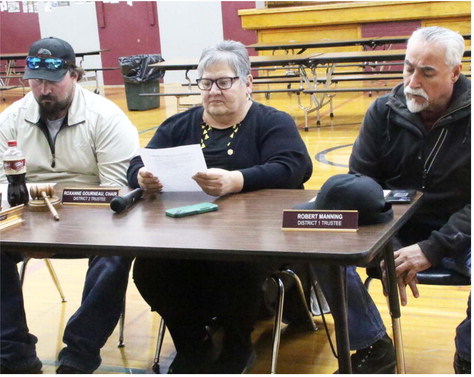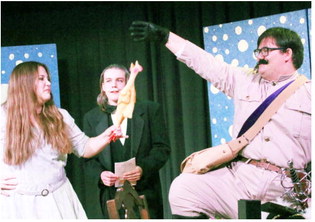Montana Legislature Ends 68th Session
With the 90th and last possible legislative day looming, the lawmakers, staff, lobbyists, reporters and other denizens of the Montana Capitol this week knew that the end of the 68th Legislature was nigh.
But if anybody expected that lawmakers would adjourn sine die in the time and manner they did Tuesday evening, May 2, they kept their cards held close.
At around 3:20 p.m., Senate Minority Leader Pat Flowers — who, as the shepherd of the Senate’s super-minority Democratic caucus, is generally not in a position to set the day’s agenda, let alone end the session — made a motion to sine die. After some back and forth over the rules with Senate President Jason Ellsworth, the motion — a non-debatable one, per legislative rules — went to the board for a vote.
The vote was 26-24. All Democrats and 10 Republicans — Ellsworth and Senate Majority Leader Steve Fitzpatrick not among them — supported the motion, ending the Senate’s work this session, putting the automatic kibosh on a number of bills and sending the Capitol into chaos.
“I think any opportunity for us to direct activities rather than be directed is satisfying,” Flowers said after the vote. “I didn’t offer a sine die motion as any kind of vindictive attempt to, you know, assert our power. I just felt like we no longer had anything to gain for Montanans or for our constituents by being here any longer. We’ve already been here longer than any session I’ve served in, and it was just time to go home. And obviously, a lot of Republicans felt the same way and voted with us on it.”
Up the hallway, the House still had a full agenda in front of it, including a final vote on House Bill 2 — the Legislature’s main budget vehicle and a prerequisite for session closure. Representatives were expecting to participate in more committees in the afternoon. The adjournment motion caught them off guard, as it did just about everyone else. The primary issue is that the House and Senate have to ultimately vote on the same version of a bill. If the House amended a Senate bill on the floor after the Senate adjourned for the session, the bill would essentially be dead. Moreover, lawmakers had spent much of the past several days in conference committees, where delegations from each chamber reconcile different versions of a bill. The Senate adjourned before it voted to concur many of those conference committee amendments, including on House Bill 816, a must-pass “end-game” bill for the GOP that provides for property and income tax rebates as well as a broad array of other expenditures.
And the governor’s office issued amendatory vetoes — which essentially state that Gianforte won’t sign a bill unless the Legislature makes his requested changes — on a number of proposals after the Senate adjourned. The fates of Senate Bill 4, House Bill 29, and House Bill 37 aren’t clear.
The House managed to catch up. It reconsidered and reversed previous votes to bring differing versions of bills, including HB 816, into alignment. It then brought the roughly $13.4 billion HB 2 up for a vote. By around 9:15 p.m., after a slate of final votes, the House, too, adjourned sine die.
“The question was always going to be do we feel like we can complete our work today or do we need tomorrow in order to finish up our work … and I’m pretty sure the Senate just answered our question for us,” Rep. Mike Hopkins, R-Missoula, told Capitolized.
Republican leaders celebrated a session marked by their party’s historic twothirds supermajority, which — when they kept the ranks together — allowed them to pass a slate of conservative policies from tax cuts to a ban on gender-affirming care for transgender youth.
In the Senate, Ellsworth and Fitzpatrick made clear their frustration with fellow Republicans’ support of the sine die motion — “I’m very disappointed that Montanans sent us here for a period of time and we couldn’t find or muster a couple more days to give to the citizens that elected us,” Ellsworth said — but lauded their caucus’ accomplishments.
“This session was one for the record books,” Ellsworth said in a written statement. “We considered the most bills of any Legislature in 50 years, delivered the largest package of tax relief in Montana history, and passed perhaps the most significant improvements in property rights and housing policy that the state has ever seen. I want to thank all senators of both parties for their hard work this session and wish them well as they return home to their local communities.”
Democrats took the opportunity to reflect on a difficult session for their party, though they also counted some wins, including a session- long push to increase payments for Medicaid providers.
“I think all things considered, we were able to exert influence on some of the key issues,” Flowers said after the vote. “We did not get everything we wanted or anything close to it. But I think we were able to steer on some issues and kill some bad bills. But that is the nature of having 16 out of 50 in the Senate.”
As the session inched closer to its end, the mood in the Capitol became increasingly congenial. Retiring and termed-out lawmakers reminisced, exchanged hugs, and brought Dixie cups containing heady brown liquid onto the floor. House Speaker Matt Regier, R-Kalispell, received a bipartisan standing ovation after his end-of-session speech.
That was a far cry from only a few days earlier, when the House in particular was consumed by the standoff between Regier and one Democrat who wasn’t on the floor Tuesday: Rep. Zooey Zephyr, D-Missoula.
Just last week, the House voted to bar Zephyr from the floor, anteroom and gallery following Zephyr’s pointed criticism of legislation restricting health care for trans youth and a subsequent protest that challenged the speaker’s ongoing decision not to recognize Zephyr during floor debate. Zephyr has since taken votes from an ad-hoc office on a bench in the hallway. The House gallery has been closed since the protest, and heightened visible security has become the norm in recent days.
Democrats made only glancing references to any of that in their farewell speeches.
“We had serious disagreements and we had to work through I would say unprecedented hard times and we were able to keep the House working for the people in Montana during that,” House Minority Leader Kim Abbott, D-Helena, said, adding that she wished the galleries were full of people to witness the session’s final moments.
For her part, Rep. Sue Vinton, R-Billings, said her caucus withstood “unprecedented and baseless attacks.”
Regier, despite his role as a central character in the Zephyr saga, sounded conciliatory on Tuesday night, handing out kudos to retiring lawmakers and making ample use of metaphors.
“There were many times of sunlight and there were also some of shade, but overall, it’s been an incredible ride over the last four months here for us all,” he said.

